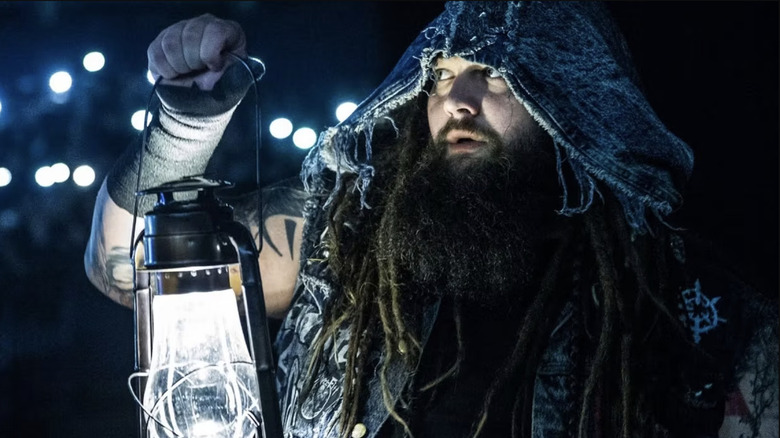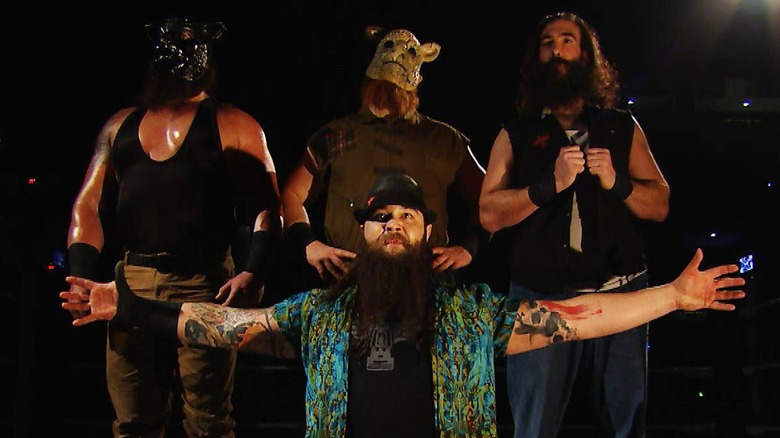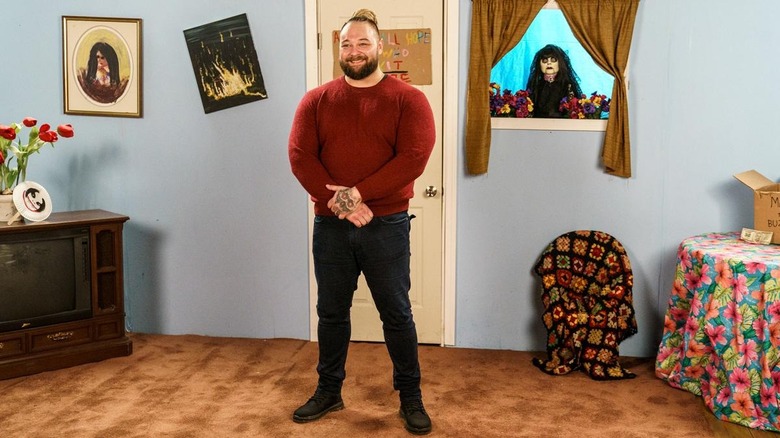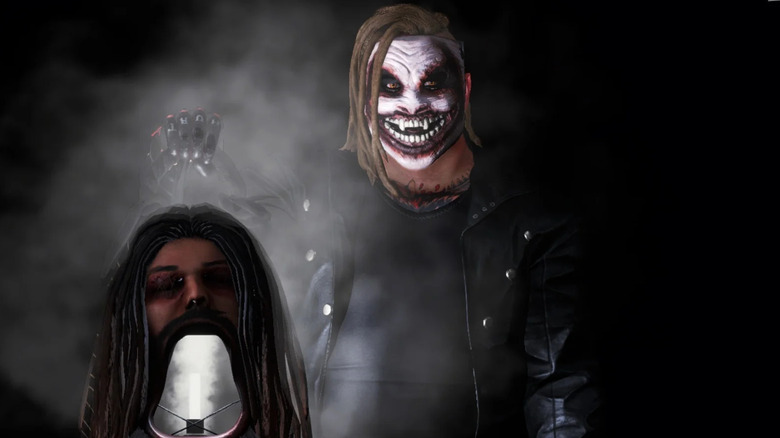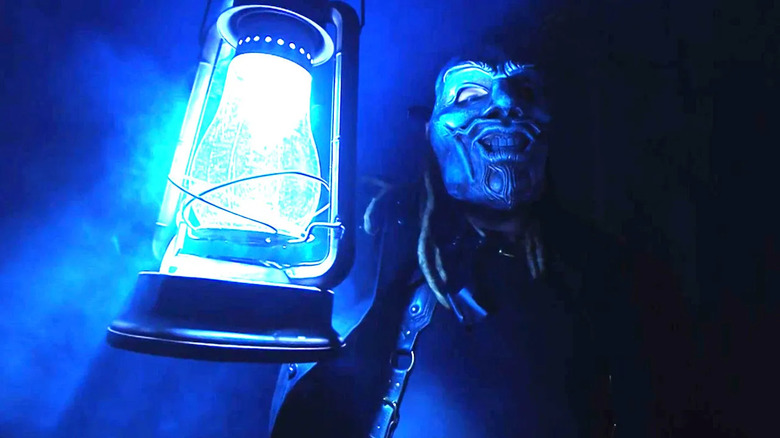Bray Wyatt Was Wrestling's Horror Icon
There have been countless wrestlers who have included spooky, undead, or horror imagery into their personas, but no one has ever done it quite like Windham "Bray Wyatt" Rotunda, who tragically passed away at the age of 36. It's impossible to overstate the brilliance Rotunda brought to the ring as Wyatt, elevating the art of wrestling to that of horror cinema. His character work was unmatched and he took risks that often felt impossible in a company known for its micromanaging and supervillain leadership. He shot for the moon and even if the gimmick didn't land right away, he never gave up on figuring out how to make it work. Few of his peers were that brave, ever. Over the course of his career in WWE, Bray Wyatt truly became the new face of fear, and incorporated horror into the world of wrestling in a way that no one before him ever could.
He was genuinely, nightmare-inducingly scary to see on screen. (No offense, Undertaker.)
Bray Wyatt as a wrestling creative was operating on a completely different level than his peers. That isn't shade to the other superstars on the WWE roster, but merely a note of praise for just how untouchable his creative genius was in the squared circle. He wasn't limited by the assumed limitations of professional wrestling, and constantly pushed for more unique angles. It's next to impossible for a wrestler to "get over" with the crowd with such a fantastical character these days, but Bray Wyatt made it happen time and time again. He wasn't just a horror movie villain in a wrestling ring; he was a bonafide horror icon.
The Wyatt Family
From 2013 to 2018, Bray Wyatt was the leader of The Wyatt Family, a backwoods cult inspired by Robert De Niro's Max Cady in "Cape Fear" and pro-wrestler Waylon Mercy. Bray Wyatt saw himself as "the nagging conscience of an immoral world," entering the ring with unsettling vignettes of birds, dead trees, and horrific imagery. Stadiums would go dark and fans would light the way with cellphones, giving the appearance of "fireflies." His subordinates (Luke Harper, Erick Rowan, Braun Strowman [and sometimes Sister Abigail]) would follow behind, often donning animal masks that resemble the ones used in the slasher movie "You're Next."
Rotunda's commitment to the role of Bray Wyatt as cult leader brought a character voice, wild eyes, and deeply effective monologues. He delivered harrowing threats toward his enemies, and took seemingly innocent phrases like "He's got the whole world in his hands" and turned them into haunting lullabies. While the usual heel would scream into a microphone about kicking ass, Wyatt would deliver a line like, "I will build my empire next to the sea so I can laugh from my throne as my enemies drown." His cult leader persona felt like an amalgamation of David Lynch and Tobe Hooper. Even when his poetic threats were confusing, the southern gothic swamp terror was palpable. Having seen him live, I can attest that his presence was equal parts overwhelming and enchanting. Had I been seated closer, I would have followed him into the dark.
Tragically, Rotunda's passing follows the untimely loss of Jonathan Huber (aka Brodie Lee aka Luke Harper) in 2020. I don't believe in an afterlife, but if there is one, I hope the duo are together and surrounded by fireflies.
Firefly Funhouse
When the Wyatt Family had finally disbanded, Rotunda took a hiatus from summer 2018 to spring 2019 and returned with a new character. Wyatt used creepy, kooky teaser vignettes leading up to the reveal, indicating the character was a demented cross between Mister Rogers and "Pee-wee's Playhouse." The character turn was one of the wildest swings a wrestler had made in decades, and somehow, it worked. He had puppets, talking animals, cartoon drawings, and goofy motivational phrases, but he committed to the absurdist horror. No matter how loud audiences would jeer or how ridiculous an opponent would act in response, Bray Wyatt would lock eyes with the camera and laugh until your skin started to feel like it was crawling off of your muscles. He'd bust out power saws and wave to the audience with a smile, he'd put on "Wyatt Gym" tank tops and Zubaz like a possessed Tony Perkis from "Heavyweights," and yet we couldn't look away.
The Firefly Funhouse gimmick became a thing of cinematic mastery during Wrestlemania 36 when he battled John Cena during the quarantine era of the pandemic. Big match John is an important enough player to have a say in the type of creative he's involved in, so his willingness to let Bray Wyatt torment him on the set of a children's show and weaponize his former wrestling personas against him like a bizarro trip into the Twilight Zone is a testament to Rotunda's creativity. The absurdity and terror were the point, and he encouraged incorporating a more cinematic element to the ring during a time when audiences were not in attendance. Cena knew Bray had the goods. Not every fan may have "gotten it," but Cena did.
And it led to what is, in my opinion, an all-time great Wrestlemania match.
The Fiend
When Wyatt wasn't in his red-sweater or Firefly Funhouse regalia, he was in his masked alter-ego, The Fiend. Donning a terrifying face crafted by none other than horror legend Tom Savini, The Fiend was like something straight out of a nightmare. He carried a severed head lantern that rembled Wyatt's cult leader persona and came out to a twisted metal cover of his old entrance music. He wore gloves with "HEAL / HURT" across the knuckles, and WWE frequently sold out of replica costume masks because people were immediately obsessed with the look. To add to the terror of The Fiend, he adopted one of the most devastating moves in all of wrestling — the Mandible Claw.
Popularized by the Mick Foley wrestling persona Mankind, the Mandible Claw sees a wrestler putting their hands in the mouths of their opponent, jamming fingers underneath the tongue while their thumb or palm presses the outside of the jaw upward. If you do it right, you can cause someone to black out. It's intimate, it's gross, and it's terrifying to see in action, which made it the perfect move for the unstoppable Fiend. To add to the horror, The Fiend often wrestled matches under red lighting, a means of throwing people off their rhythm and cloaking the audience in blood red.
When The Fiend became the WWE Universal Champion, Savini's studio was once again tapped to create a championship belt, and did so by completely ignoring the conventions of a big, gold faceplate ... and instead designing a literal face plate based on the mask. It was as if The Fiend was wearing his own stretched flesh across his waist, looking like something out of a Rob Zombie movie. Considering Zombie's most famous horror movie creation is the Firefly Family of "House of 1,000 Corpses," "The Devil's Rejects," and "3 From Hell," it's fitting that the man who used to walk amongst the fireflies would express such similar horrors.
Wyatt 6 and Uncle Howdy
Rotunda had been battling health issues for quite some time and took a step away from the ring before returning in 2022. WWE teased his return with references to the "White Rabbit" before he appeared during the Extreme Rules pay-per-view ... or at least, what looked like Bray Wyatt appeared. A figure of Wyatt's approximate build arrived with a new mask resembling that of The Grabber in "The Black Phone," quoting Clive Barker's "Abarat" as a promo.
The reveal was the start of something called the "Wyatt 6," a group of six characters (all Bray Wyatt) at odds with one another. One of the characters was named Uncle Howdy, based on Richard Kiel's Captain Howdy character from the film "Hysterical." Notably, the name "Captain Howdy" is also the alter ego of the demon Pazuzu in "The Exorcist." The masks were crafted by Jason Baker of Callosum Studios, the company he runs with, you guessed it, Tom Savini.
This storyline wasn't able to be seen through as Rotunda took time away to focus on his health, but it was all but confirmed that wrestler Bo Dallas (real name Taylor Rotunda and brother of Windham) was the man behind the Uncle Howdy mask. This would have put both Rotunda brothers (third-generation wrestlers themselves) in a feud, and allow the pair to work together in the closest capacity since signing on to WWE. Bray Wyatt wasn't just a wrestler playing around with a creepy character, he was a die-hard horror fan and movie lover who let that passion influence his work in every way. He was one of us.
He will be greatly missed.
